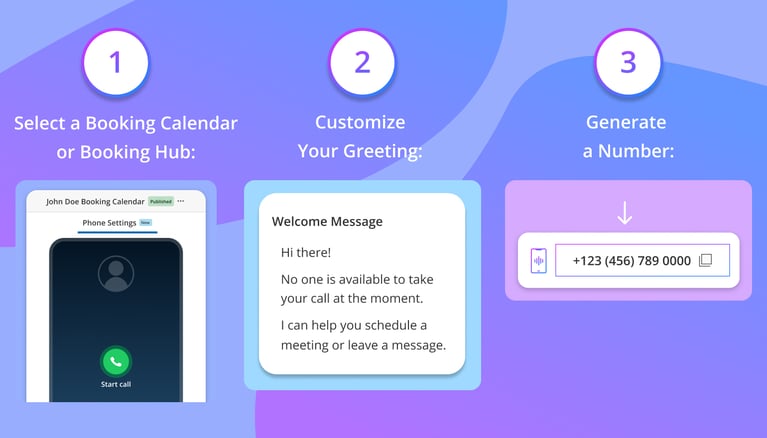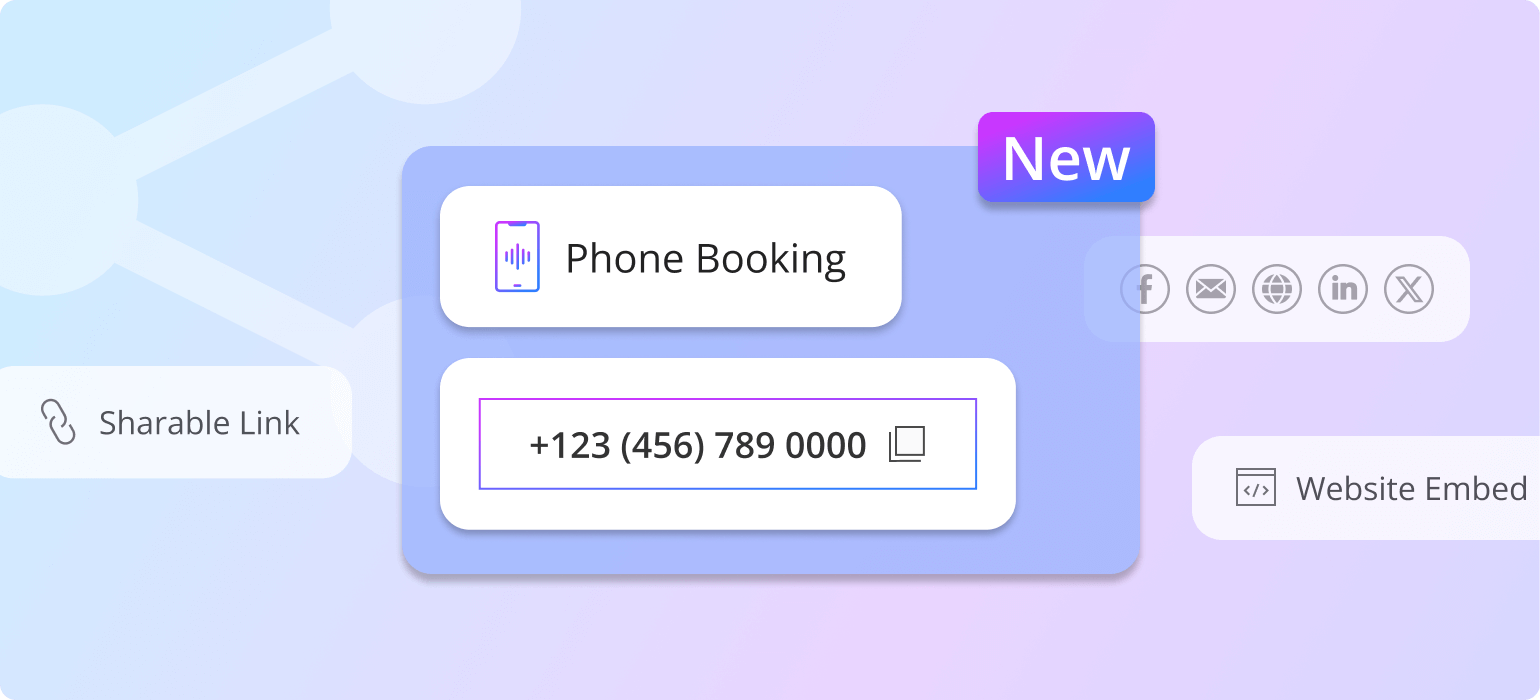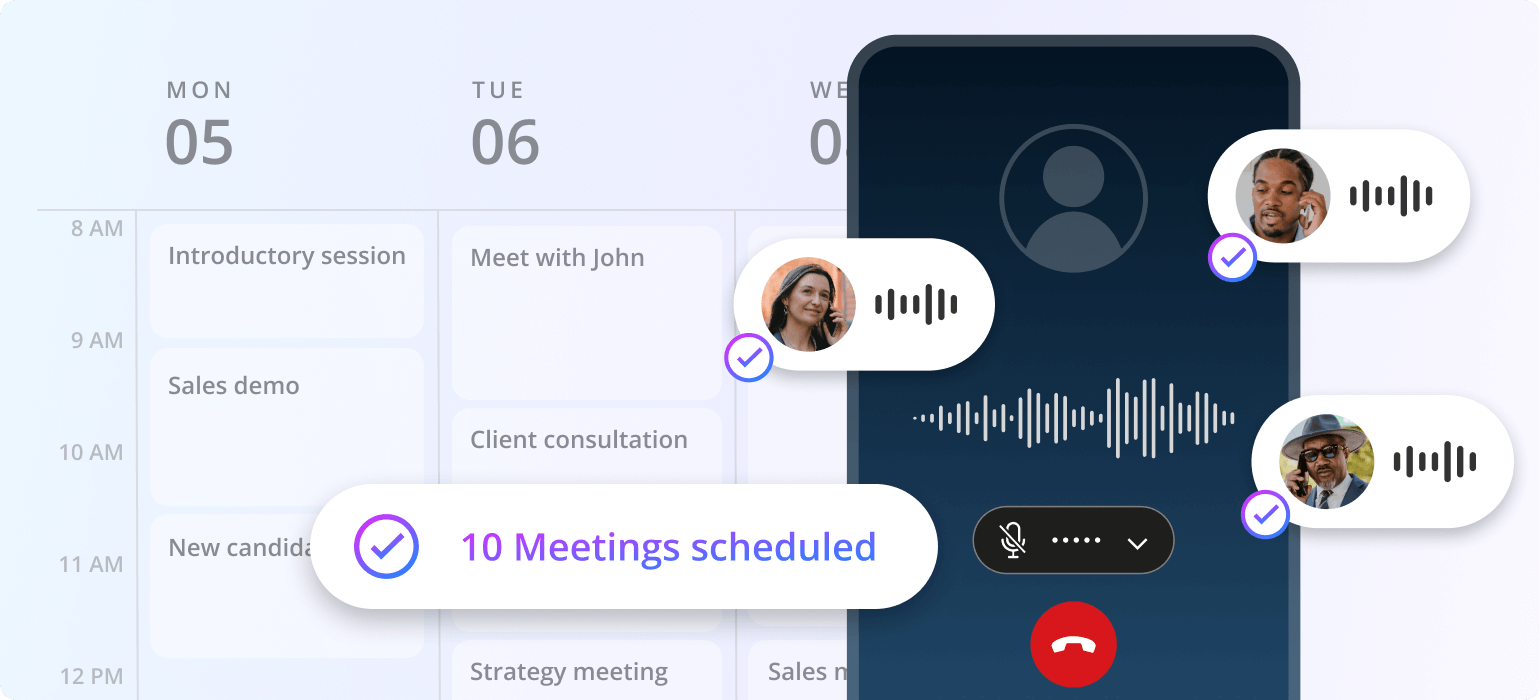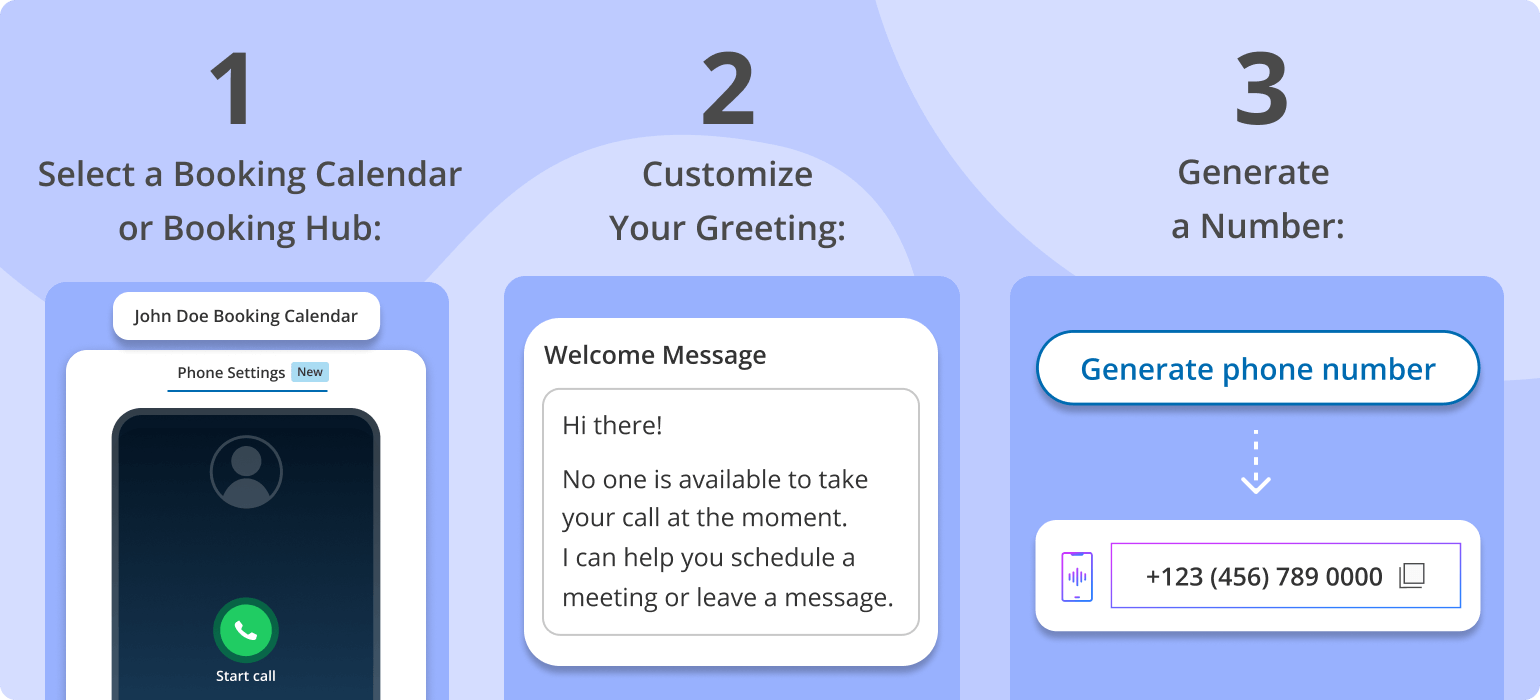How to Create a Booking Link (With a Voice Option)

You know that handy booking link? It’s that shareable web address that lets people quickly find a time to meet with you or your team. Businesses use them every day to automate scheduling, allowing clients and prospects to book appointments at their convenience, letting them set appointments quickly and easily, without having to play phone tag or wait for an email reply. Booking links also streamline the process by eliminating the need for clients to manually search for available times or services.
But here’s a common truth: even with the best online systems, some people just prefer to call. They might find web forms tricky, or maybe they simply like the personal touch of a phone conversation. According to a study, more than half (58%) of consumers say they are likely to call a business when they need a quick response or to book an appointment.
In this guide, we’ll explore exactly how to create a powerful booking link that works for everyone. Creating a booking link may require setting up an account on a scheduling platform, which enables access to advanced features and customization. We’ll also explain why phone booking isn’t just a nice extra, but an essential, often-missed way to make sure you never miss a connection, even for those who prefer to speak rather than click.
What is a Booking Link?
.png?width=1540&height=700&name=what_is_a_booking_link%20(1).png)
A booking link is much more than just a way to access your calendar.
It’s a fully customizable tool that brings together everything you want to communicate before a meeting is scheduled — and everything that needs to happen after. Modern scheduling software often provides the ability to create a dedicated booking website, where clients can access personalized booking links and manage their appointments with ease.
When someone clicks your booking link, they’re not just seeing available time slots. They’re stepping into a carefully designed scheduling experience that reflects:
-
Your availability and time preferences
-
Your meeting types and formats (in-person, virtual, etc.)
-
Your location constraints
-
Your workload limits (like daily caps or buffer times)
-
Your rules for cancellations or rescheduling
-
And the workflow that follows, including automated reminders and confirmation messages
These features and workflows are typically managed through scheduling software, which centralizes all booking-related activities for greater efficiency.
In short, it’s a smart link that helps you set the terms of the meeting before it even gets booked — all while making the process fast and frictionless for your guests.
Two Common Booking Link Formats
Depending on how your business operates, there are a couple of popular ways to structure your booking link — both designed to give your customers the smoothest scheduling experience possible.
1. Booking Calendars:
A direct link to one person’s or one service’s calendar. Ideal for solo professionals or those offering multiple meeting types.
-
Customize your meeting types and durations
-
Show only real-time availability
-
Collect info through booking forms
2. Booking Hubs:
A central scheduling page that displays multiple calendars or services. Great for teams, departments, or businesses with a range of offerings.
-
Booking hubs allow businesses to display and manage multiple staff or service schedules in one central location, making it easier for clients to find the right time and person.
-
Let visitors choose who to meet or what service they need
-
Automatically route them to the right calendar
-
Perfect for demos, support, interviews, onboarding, and more
Why Booking Links Matter for Modern Scheduling?
Booking links are more than just a convenience; they’re an essential part of how businesses manage their time and serve their customers today. They bring several big benefits that make scheduling smoother for everyone:
-
They save time for both businesses and customers: Think about all the minutes (or hours!) spent on back-and-forth emails or phone calls just to set one meeting. Booking links eliminate this tedious process, giving that time back to you and your clients.
-
They cut down on no-shows and scheduling errors: When people book directly into your real-time calendar, the chance of double-bookings or mistaken times drops significantly. Booking links help prevent double-booking by automatically updating your availability and syncing with your calendar. Plus, many systems automatically send reminders, which helps ensure everyone shows up.
-
They offer instant, 24/7 access to your availability: Your business doesn’t operate only from 9 to 5. A booking link lets potential clients or customers schedule with you anytime, day or night, from anywhere in the world. This means you can capture interest and secure appointments even when your team isn’t actively working.
In addition, booking links enhance the overall customer experience by making scheduling more convenient and personalized, which helps increase client satisfaction and retention.
Now that you understand the powerful advantages of booking links, let’s explore how you can effectively deploy them to reach your audience wherever they are.
Also read: Digital Calendar Etiquette: When Sharing a Booking Link is the Wrong Move
What are The Different Ways to Use and Share Your Booking Link?
Your booking link isn’t just a URL — it’s a flexible, powerful way to meet your customers where they are. You can invite clients or prospects to book appointments by sending them your booking link directly. You can also share payment links alongside your booking link, allowing clients to make payments securely and conveniently as part of the booking process. Integrating payments with your booking link streamlines the entire process for both you and your clients. Whether online or offline, embedded or shared, here’s how you can make the most of it.
What Makes a Great Booking Link Even More Powerful?
Before we jump into sharing your booking link, let’s look at what makes one effective. These built-in features turn a basic link into a smart, branded, and always-on scheduling assistant.
-
They’re Mobile-First: Your booking page adjusts to any screen — phone, tablet, or desktop. No zooming or awkward scrolling required.
-
They Reflect Real-Time Availability: Your link shows only open time slots, reducing double bookings and confusion.
-
They Cut Down on No-Shows: Automated reminder notifications ensure clients don’t forget their appointments.
-
They’re Fully Branded (When Supported): Depending on your software and plan, you can customize colors, logos, and messaging to match your brand.
-
They’re Always On: Let customers schedule with you anytime, day or night — even while you sleep.
-
They Help You Track Everything: Keep tabs on appointment data, resource usage, and client interactions to optimize your time and improve service.
-
They Can Process Payments: Advanced booking links can process payments directly, allowing clients to pay for services at the time of booking for a seamless and convenient experience.
Share It Anywhere Your Customers Are
Once your booking link is polished and ready to go, it’s time to get it in front of your audience. Whether it’s online, in an email, or on printed materials — here’s where to share it.
-
Add it to your Website: Want people to book without leaving your site? Embed your booking link as a full page, a pop-up window, or a section of any webpage. Integrating booking links directly into your own website provides a seamless experience for clients to schedule appointments and access additional features.
-
Include it in Email Signatures: Turn every email into a scheduling opportunity. Drop your link into your signature so clients and prospects can book a meeting without needing to ask.
-
Share it on Social or Business Profiles: Post your booking link on LinkedIn, Instagram, or Facebook, or add it to your bio. You can also share your booking link through your favorite apps, such as messaging or social media platforms. It’s the easiest way to let your network schedule time with you — no messages required.
-
Use QR Codes for Offline Touchpoints: Print your booking link as a QR code on business cards, flyers, or even your storefront. It gives customers instant access to your calendar, even from a paper brochure or poster.
Many businesses also use dedicated apps to manage and share their booking links on the go.
Booking links make it easy for people to schedule online, but what about those who prefer to call? To truly meet your customers where they are, it’s time to think beyond the link.
Extending Your Reach Beyond Online Booking Links
Booking links are incredibly effective, and they’ve transformed how businesses manage appointments online. They make it easy for many customers to schedule at their convenience, directly from a webpage or email. However, relying solely on online booking can mean missing out on valuable connections, especially when some customers simply prefer to call.
Integrating both online and phone booking options ensures your entire business is equipped to capture every client interaction, regardless of the channel.
Think about it:
-
Some customers simply prefer to call: For many, picking up the phone feels more natural and direct than filling out an online form. If your business values every inbound call, an online link alone might not fully address this preference.
-
Unanswered calls often lead to missed opportunities: When a potential client calls and reaches a standard voicemail, they might just hang up and try a competitor who responds immediately. That ringing phone could be your next big booking, but without a streamlined process to guide them, that opportunity might slip away.
Integrating SMS messages allows you to automatically follow up with clients who call but don’t book immediately, increasing your chances of securing the appointment. -
Manual phone scheduling doesn’t scale easily: Relying on staff to answer every call and manually book appointments is time-consuming and expensive. It’s tough to consistently handle a high volume of calls, particularly outside of standard business hours, which means potential bookings are lost.
So, while online booking links excel at capturing web-based interest, effectively handling phone inquiries requires a different solution. That’s where intelligent phone booking becomes a key component of your comprehensive scheduling strategy. Securely managing customer data collected from both online and phone booking channels is also essential to ensure privacy and seamless service.
Also read: How to Get Customers to Book Online Instead of Calling
Introducing Phone Booking as a Deployment Option

Traditional booking links work wonders for online scheduling. They’re perfect for websites, emails, and social media. But what happens when a potential client picks up the phone? That’s where a crucial piece of the scheduling puzzle often goes missing.
This is exactly why phone booking comes in as a voice-based extension of your existing booking link. It’s not a replacement for your online system; it’s a powerful addition, designed specifically for inbound calls.
“Practices that offer both online and phone scheduling were booked 24% more than those that only offered booking by phone. This clearly shows that combining digital and voice booking options captures more appointments and meets diverse customer preferences.” - Solutionreach, 2024
With a dedicated app, users can seamlessly manage both online and phone bookings in one place, making it easier to handle appointments from every channel. It’s ideal for people who prefer to speak rather than click, ensuring you can capture bookings from every channel your customers might use to reach out.
How Phone Booking Works as a Voice Deployment?

So, how does phone booking work its magic, transforming a simple phone call into a confirmed appointment? Think of it as your booking link gaining a voice and a brain. The system can assign staff and manage bookings across multiple locations, ensuring clients are directed to the right service point and available team member.
Here’s how this voice-based system operates, handling bookings for classes, group events, events, as well as appointments:
Connects Directly to Your Existing Calendar
The core of phone booking is its link to your already set-up online booking system. This means all your availability, meeting types, and busy slots are automatically reflected in what the voice assistant offers callers.
The system can also integrate with Google Calendar and Outlook, keeping all your appointments synchronized and preventing scheduling conflicts. There’s no separate calendar to manage or manual updates needed.
Uses Natural Language to Book Appointments
Instead of navigating complicated phone menus or pressing numbers, callers simply use their own words. The phone booking feature listens, understands their intent, and guides them through finding a suitable time using natural conversation, just like talking to a human assistant.
Handles Scheduling and Voicemail Automatically
This system does double duty. It can intelligently schedule appointments directly into your calendar based on your availability. As part of the booking process, the system can also prompt callers to complete intake forms, streamlining information collection and improving patient onboarding.
But if a caller isn’t ready to book or simply wants to leave a message, the system can smoothly handle that too, ensuring no inquiry is ever missed.
Runs 24/7 Without Manual Intervention
One of the biggest benefits is its constant availability. Your phone booking system is always on, ready to capture appointments or messages, even outside of your regular business hours. This means opportunities aren't lost because someone called when your office was closed or your team was busy.
With these powerful benefits in mind, you might be wondering how simple it is to get started. Let's look at how you can add phone booking to your scheduling strategy with OnceHub.
Getting Started with Phone Booking in OnceHub

Adding phone booking to your OnceHub setup is surprisingly simple. If you already have your online booking link organized, it’s just a few quick steps to give it a voice and start capturing calls as scheduled appointments. By enabling phone booking, you can accept bookings from both online and phone channels, making it easier for users to schedule appointments through their preferred method. No complex coding or extra tools are needed.
You can start using OnceHub's phone booking feature with a free trial—no credit card required.
Here’s how you get started:
-
Step-by-step: Set up your booking page
First, make sure your online booking page (your booking link) is set up exactly how you want it. This includes your availability, meeting types, and any questions you ask people when they book. The phone booking feature uses these same settings.
Note: OnceHub offers flexible pricing plans, including custom pricing for larger businesses. You can also take advantage of packages and discounts for bundled services to maximize value and streamline scheduling.
-
Generate your phone booking number
Once your booking page is ready, open it in your OnceHub editor. Look for the “Phone Settings” tab. With a simple click, you can “Generate a phone number.” That’s it! Your booking page now has its dedicated phone line.
-
Customize your phone greeting and booking options
You can use a standard welcome message for callers or personalize it to match your brand’s voice. This first impression sets the tone. All your existing settings, like different meeting types or booking forms, are automatically translated into voice options, making the scheduling process familiar and easy for callers.
-
Works out of the box — no complex setup needed
The best part? Once you generate the number, the system is ready to go. You don’t need to configure complicated voice menus or intricate call flows. It simply works, allowing you to focus on your business, not on the technical setup.
Now that you know how simple it is to add phone booking, let’s look at some real-world examples of businesses that truly benefit from this powerful feature.
Real Business Scenarios Where Phone Booking Shines
While a booking link is incredibly useful for online interactions, some situations really highlight the power of adding a voice option. Here are a few real-world scenarios where phone booking can make a significant difference:
-
Service businesses that receive frequent phone inquiries: Think about a busy salon, a dental office, or a plumbing service. Many of their potential clients will naturally call to book. If these calls aren’t handled efficiently, those leads can be lost. Phone booking turns every inbound call into a potential scheduled appointment, reducing the load on staff and ensuring no inquiry goes unanswered.
By making it easier for people to schedule appointments over the phone, businesses can attract more clients who might otherwise hesitate to book online. -
Companies with customers who aren’t comfortable booking online: The 50-plus population is embracing technology, but barriers remain, and many still rely on phone calls for important interactions. Not everyone is tech-savvy. Some demographics or client segments simply prefer speaking to someone to arrange services.
For businesses serving older populations or those with limited internet access, offering a phone booking ensures inclusivity and broadens their reach beyond purely online methods. - Businesses with after-hours call volume: If your business gets calls outside of regular working hours, a traditional voicemail might mean you miss out on bookings until the next day.
46% of phone leads convert during the call, and phone conversations stay key conversion points where revenue is gained or lost—even outside regular business hours.
Phone booking acts as a 24/7 assistant, ready to capture appointments at any time, even when your team isn’t available. This ensures you never miss a chance to get a new client on the calendar, maximizing your operational hours without adding staff.
We’ve covered a lot about creating booking links and the added power of phone booking. To wrap things up, let’s answer some common questions you might still have.
Ready to Modernize Your Booking Experience?
We’ve covered a lot about the power of booking links, from how to share them everywhere to how they streamline your schedule. We’ve also explored why adding a voice option through phone booking isn’t just an extra feature—it’s a way to truly open your doors to every kind of customer, capture every inquiry, and avoid missing out on valuable connections. By combining the ease of online self-service with the accessibility of voice, you create a robust, omnichannel scheduling system that works tirelessly for your business.
Don’t let a missed call mean a missed opportunity. Take the next step in modernizing your booking experience. Start your free OnceHub’s Phone Booking feature today and see firsthand how a smart booking link, empowered with a voice option, can transform your scheduling and help you connect with everyone.
Frequently Asked Questions
What is a booking link and how do I share it?
A booking link is a unique web address that lets people schedule appointments directly with you or your business. You can share it anywhere you communicate with clients: in emails, text messages, social media posts, or embed it on your website. It's the core of self-service scheduling, making it simple for people to see your availability and book a time.
Can I create a booking link for free?
Yes, many online booking systems offer free plans that allow you to create a basic booking link. These free options are a great way to start automating your scheduling, though paid plans usually offer more features, customization, and advanced integrations.
How does phone booking work with my booking link?
Phone booking acts as a voice-activated extension of your digital booking link. When someone calls your dedicated phone booking number, an AI assistant uses natural language to guide them through your available times and meeting types, which are pulled directly from your existing online booking calendar. The call essentially translates the online booking process into a voice conversation, making it easy to secure appointments over the phone.
Do I need extra tools for phone booking?
With solutions like OnceHub, you typically do not need extra tools. Your phone booking works directly with your established booking pages and calendar settings. It's designed to integrate seamlessly into your existing scheduling automation setup, making it a straightforward addition to your booking options.
Can phone booking handle voicemail?
Yes, a key benefit of advanced phone booking systems is their ability to handle voicemails. If a caller isn't ready to book or prefers to leave a message, the system can record it, automatically transcribe it, and even provide a summary. This ensures you never miss a valuable inquiry, even when you're not available to answer the phone.
How do I switch from a regular booking link to a phone booking?
The process is designed to be simple. Typically, if you already have an online booking system set up, you can add phone booking by generating a dedicated phone number within your existing booking page settings. This involves little to no complex setup, allowing you to offer a voice option to your clients quickly.
Better scheduling starts here
No credit card required